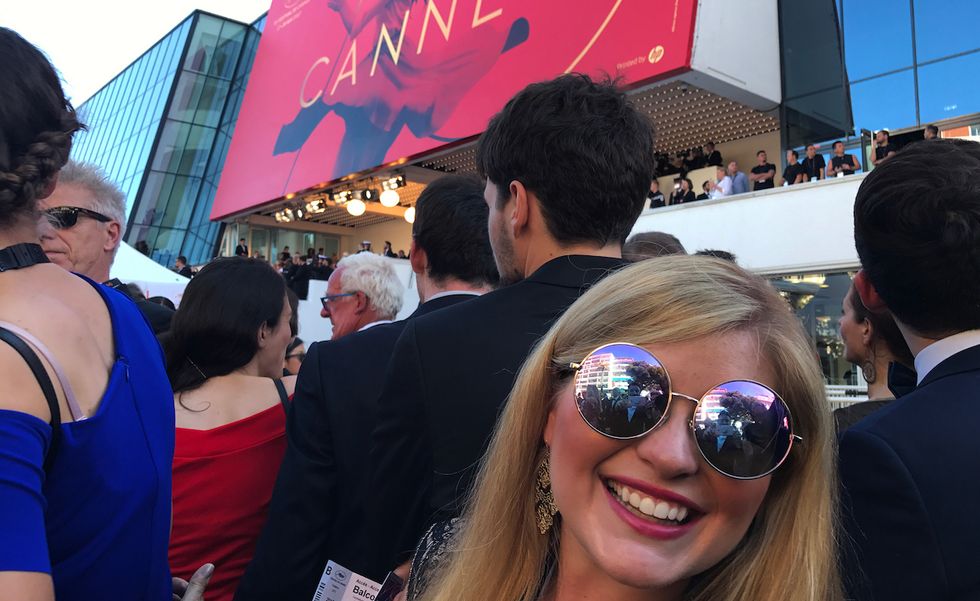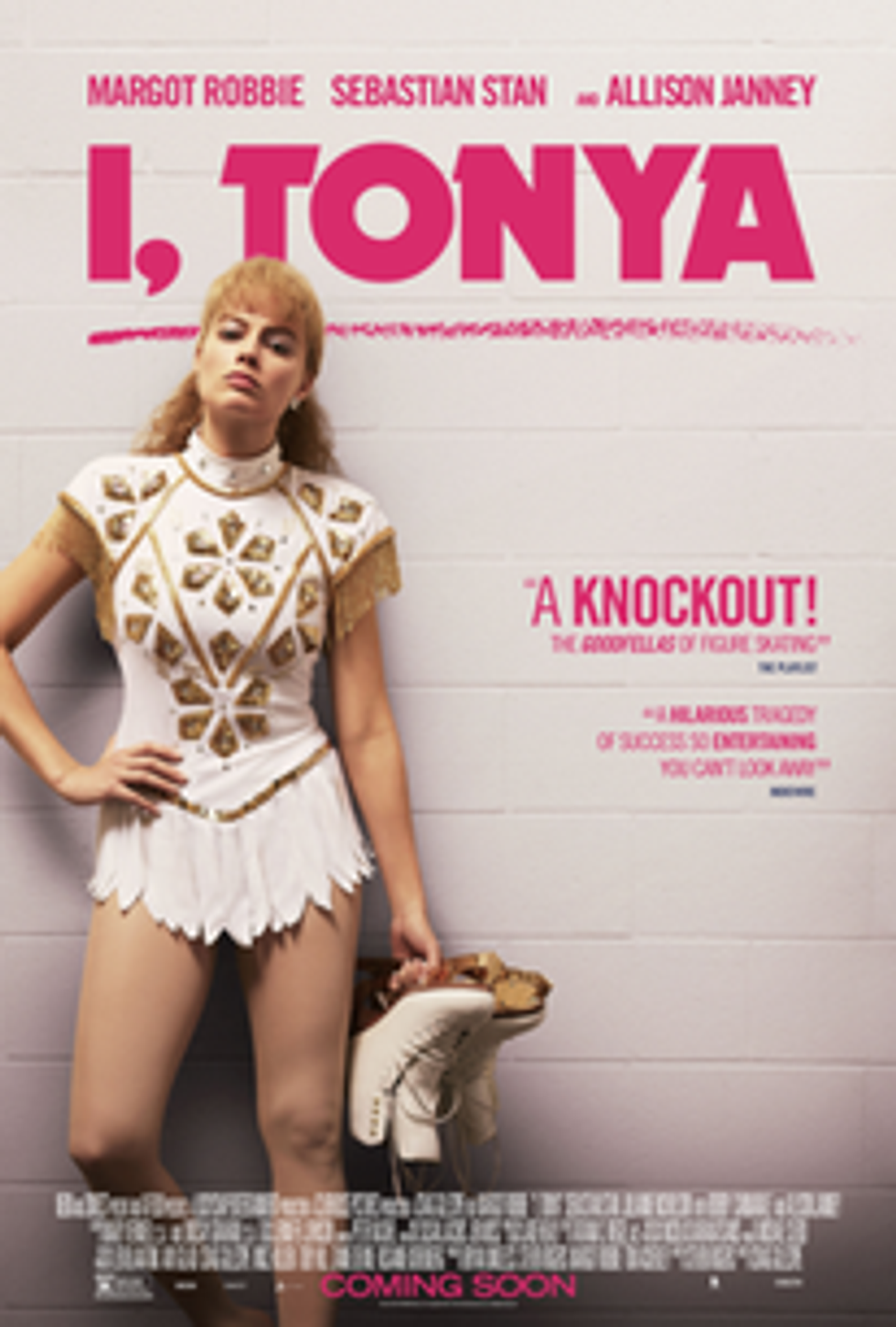This past summer, I managed to finesse my way into the Cannes Film Festival. During the 12-day extravaganza of red-carpet premieres and controversial booing, I tried to study the factors that influence whether the film-critic bourgeoisie approves or disapproves of a movie.
While it was never stated out loud, I learned how important it is to a lot of critics that a film have some kind of depressing, political meaning behind it. Otherwise, some might say that it “isn’t contributing to society.” On a more academic note, I learned about terminology. Quick vocabulary lesson: an ellipsis is a period of time left out of a story because what happens during that duration isn’t integral to the plot, and/or is implied strongly enough that it can be absent. An example of this is in “Mean Girls” after Regina George gets hit by a bus. Next, we see her in her Spring Fling dress, accompanied by a neck brace. Depicting the ambulance ride and hospital visit that likely happened in between wouldn’t have been necessary to advance the plot. This is just one example of a technique that is used in the majority of films at some point or another. Other terms I learned related to camera shots and procedures, genres, and narration.
Through my experience, I’ve found a new appreciation for the film industry. However, my opinions on films themselves haven’t changed much. In addition to my new-found knowledge, because of all the viewing I did before, during, and after the festival, I’ve seen more Oscar-nominated pictures than ever before in my life. Here are my ordinary-girl thoughts on a few of them.
I, Tonya
Favorite Quote: “I hit her once. With a hairbrush.”
This film hits you with the unexpected backstory of Tonya Harding (Margot Robbie), public enemy number one of 1994. The trailer brings up a good point, America wants someone to love, and America needs someone to hate. We will probably never know the true extent to which Harding was involved in the Nancy Kerrigan knee assault, however we do know that the story was painted as black and white. “I, Tonya”gives the grey-area perspective.
It doesn’t take long for the viewer to fall in love with Harding. Before she even hits the ice in the opening scene, you find yourself rooting for the tiny, blonde four-year-old looking longingly at the older girls’ sparkly outfits. You’re holding your breath later as she attempts the triple axel as an adult, and then you’re shaking your fists in triumph as “Feels Like the First Time” begins to blast from the speakers after she lands it. It was such a well-done scene, that I almost didn’t believe the tricks were computer generated.
Allison Janney takes on the role of Tonya’s mother, LaVona Harding, and is divine. Daughters of helicopter moms everywhere relate to the dysfunctional relationship between Tonya and LaVona, especially when the line “I made you a champion, knowing you’d hate me for it!” echoes out of Janney’s mouth during an argument inside of a diner.
The film breaks the fourth wall* constantly as we see the story unfold according to the retellings from separate interviews of Harding and her ex-husband, Jeff Gillooly (Sebastian Stan). In one particularly humorous scene told from Gillooly’s point of view, Robbie looks directly into the camera while holding a large shotgun and says, “this definitely didn’t happen,” before firing it at Stan. Harding is portrayed as being unapologetically herself, redneck roots and all.
While the film is hilarious, the ending reminds us of an often-forgotten lesson. Celebrities are people too. Following “the incident,” Harding was placed on trial in the court of public opinion for months. She was America’s punching bag, until the country found something else to talk about.
“I was loved for a minute. Then I was hated. Then I became a punch line.”
Gillespie does an excellent job of entertainingly and vividly telling Harding’s side of the story, beyond the Kerrigan incident. Also, I want to point out that neither Margot Robbie nor Stan Sebastian are from America, yet their backwoods Oregon accents were spot on.
*Breaking the fourth wall refers to when a character addresses the audience directly.
Writer: Steven Rogers
Director: Craig Gillespie
Running Time: 120 minutes
Main Cast: Margot Robbie, Sebastian Stan, Allison Janney
Rating: R

Three Billboards Outside of Ebbing, Missouri
Favorite Quote “You do not allow a member of the public to call you a f*ckhead in the station house!”
Martin McDonagh’s film opens with an emotionless, tired-looking woman in a denim jumpsuit driving down a lonely backroad. The camera pans out into a long shot* and shows us that the road has three vacant billboards.
The hunt to find Mildred Hayes’ (Frances McDormand) daughter’s murderer has fizzled out, because the cops have no more leads. In retaliation, Mildred rents the three billboards we see in the opening sequence to send three messages. The blood red panels read, “Raped while dying,” “And still no arrests?” and “How come, Chief Willoughby?” We learn that the desolate road is where her daughter’s burnt body was found.
The colorfully worded film is classified as a drama, but I refuse to call it anything besides a dark comedy. It wasn’t until it was over that it dawned on me how heavy it was. The tragic backstory is there, but among it is ridiculous quips of dry humor. They cause you to forget that almost all of the characters are kind of horrible.
Mildred’s ex-husband Charlie (John Hawkes) is a violent pyromaniac who continuously tries to cut Mildred down with his words. His new girlfriend Penelope (Samara Weaving) is the kindest character in the film, and lands at the butt of everyone’s jokes because of her airheadedness. Officer Dixon (Sam Rockwell), the film’s token mama’s boy, is a bratty, angry and racist man-child. When asked about the claim that he tortured a black arrestee, he responds by correcting the person’s use of the n-word.
“It’s ‘persons of color’ torturing business these days,” he says quickly and defensively.
Chief Willoughby (Woody Harrelson), the name in lights, doesn’t fit the role of a villain at all. He is still trying to figure out who murdered Angela Hayes, while suffering from pancreatic cancer. Our heroine Mildred does not behave rationally whatsoever, yet we continue to root for her because we understand the source of her pain.
Mostly in the background, a theme of racism thinly flows throughout the film. It’s just enough to catch the viewer’s attention but not enough to keep it. In the first quarter of the film, Mildred’s friend Denise Watson (Amanda Warren) is arrested by Dixon. The arrest was a threat to Mildred that if she didn’t settle down, then all of her black friends were going to be targeted. Later in the film when she’s released and reunited with Mildred, most of the viewers had forgotten about her. This scene alone makes me wonder what McDonagh actually wanted to convey with this production. I’m undecided on whether it is subtle enough to be effective…or completely misses the mark.
I laughed a lot while watching this film, but I felt frustrated once it was over. It was realistic, because McDonagh reminds us that (at least sometimes) there are no actual good guys.
Three Billboards is supposedly the front-runner for the Best Picture Oscar.
*Panning is similar to zooming in and out, but is typically done by physically moving the camera as opposed to using the zoom function on a lens. A long shot is an establishing shot that shows a scene in its entirety.
Writer: Martin McDonagh
Director: Martin McDonagh
Running Time: 115 minutes
Main Cast: Frances McDormand, Woody Harrelson, Sam Rockwell
Rating: R
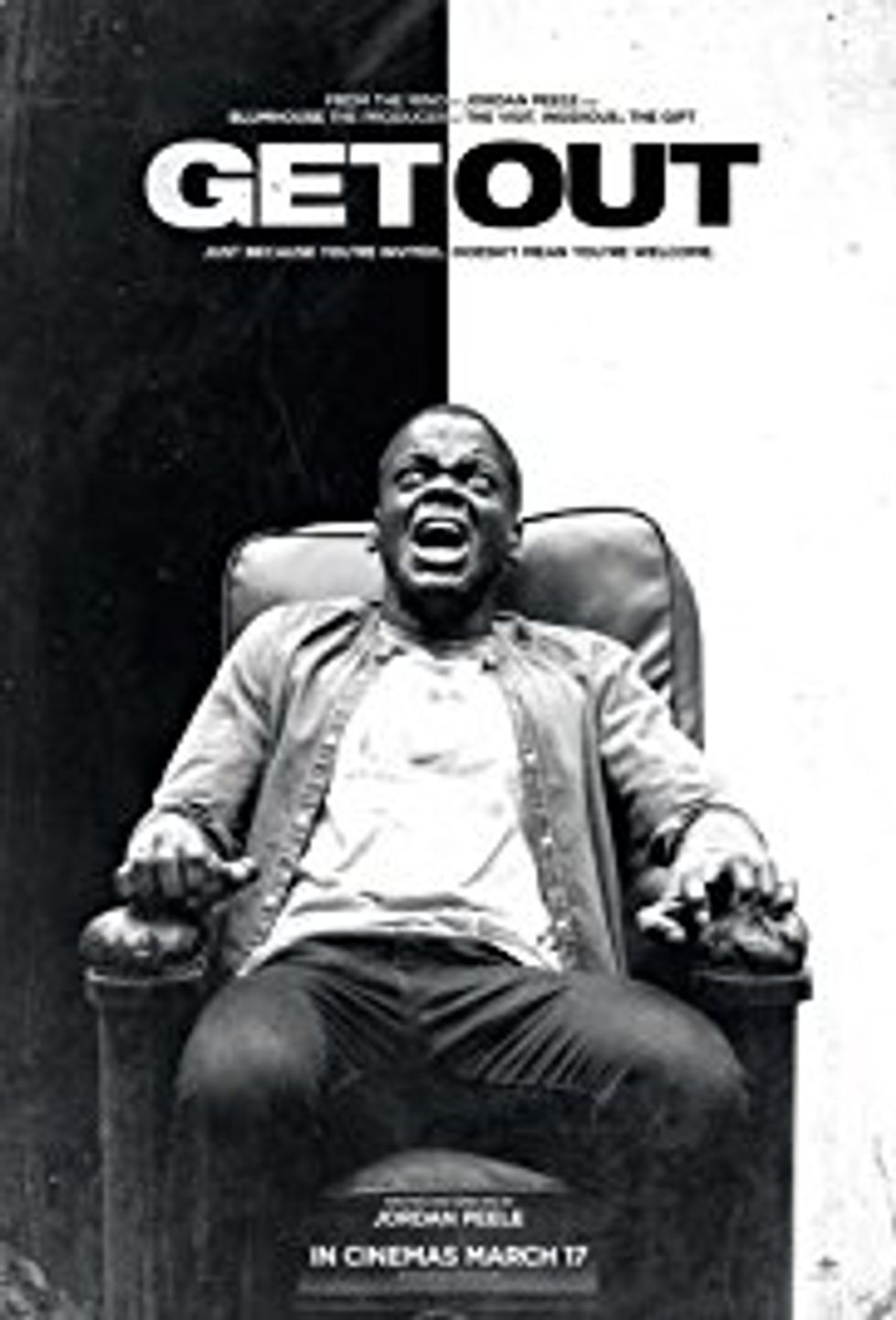
Get Out
Favorite Quote: “If I could, I would have voted for Obama for a third term.”
Peele’s satire is the uncomfortably necessary film that we’ve been missing. As a white woman, I have never been able to relate to the idea of “being the only black person in the room.” “Get Out” gives us an enlightening slight glimpse of how it feels through the protagonist, Chris (Daniel Kaluuya). He is dating Rose Armitage (Allison Williams), a white woman who invites him to come meet her parents. Chris reluctantly agrees but is obviously nervous about their potential disapproval. The (white) viewers relax a little bit when Chris is warmly greeted by Mr. and Mrs. Armitage (Bradley Whitford and Catherine Kenner). However, their odd we-love-black-people compensatory statements quickly become off-putting. At their weekend social gathering, we see that their friends are just like them – pretentious allies, marchers of rallies, “big Tiger Woods fans” that are constantly patting themselves on the back for being supporters of the cause. Peele didn’t place his protagonist in a hostile environment with loud white supremacists because that would have been too easy.
One powerful moment in the film is when the Armitage’s black housekeeper, Georgina (Betty Gabriel), smiles and verbally says to Chris that she feels comfortable in the Armitage household. Simultaneously, tears fall from her eyes, rolling down her cheeks past her creepy smile. We receive two polar opposite perspectives from the same face.
The most telling moment of the film was the end. After a bloody escape, Chris finally manages to get out of the house. However, more violence quickly ensues as Rose comes after him with a shotgun and her “grandpa,” the showdown eventually dwindles down to them two…until a cop car pulls up flashing its lights.
Everyone in the audience, no matter the color of their skin, stops breathing. Chris had been held hostage in leather restraints, sold, and was minutes away from having part of his brain removed by his captors. Despite this…everyone in the audience’s eyes widen, waiting to see if Chris gets shot, handcuffed, or both. The collective sigh of relief soon follows as Chris’s best friend Rod (Lil Rey Howery) gets out of the car.
Upon research, I learned that in Peele’s original ending, Chris went to prison for the rest of his life. I’m glad he changed it. In this case, the 4 seconds of assuming the worst was much more powerful than actually seeing it happen.
Writer: Jordan Peele
Director: Jordan Peele
Running Time: 104 minutes
Main Cast: Daniel Kaluuya, Allison Williams, Bradley Whitford, Catherine Keener
Rating: R
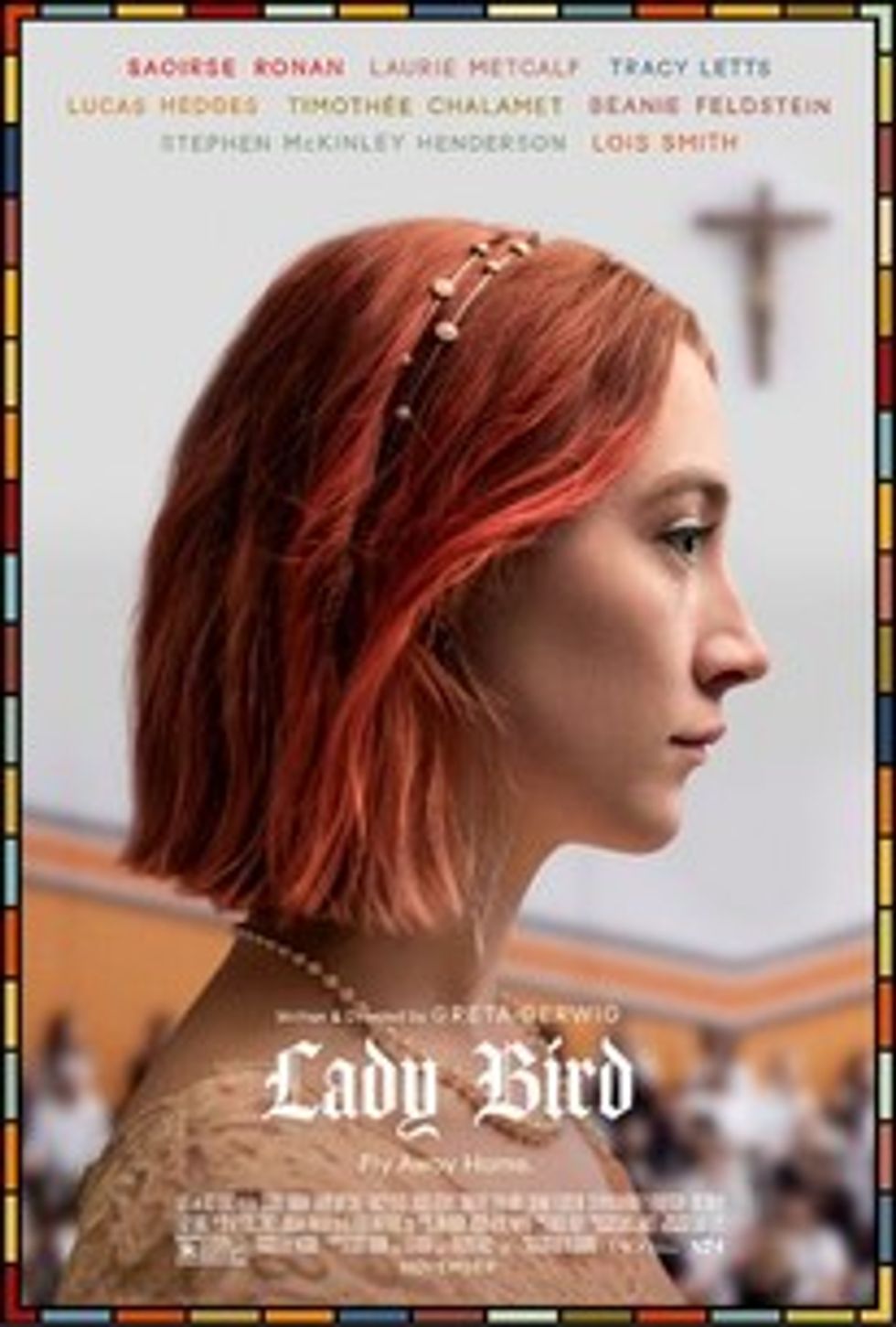
Lady Bird
Favorite Quote: “Listen, if your mother had had the abortion, we wouldn’t have to sit through this stupid assembly!”
This is a coming-of-age story* that takes place during the early 2000s recession in Sacramento, California. Lady Bird (Saoirse Ronan) is the new name that Christine has given herself in the wake of her “I hate this town, I hate all of these people, I’m going to get out” stage. This is a frustrating time of life that most of us have gone through and may or may be not still going through. Sadly, Lady Bird’s dream of flying out of California seems bleak. Her mother (Laurie Metcalf) is working double shifts in an attempt to compensate for her job-hunting husband (Tracy Letts) who got laid off. Through its entirety, the film serves as an illustration of the middle class that tends to get hit the hardest during economic recessions.
I didn’t realize early 2000s nostalgia existed until I saw this movie. The first thing Lady Bird does on the morning of her 18th birthday is run to the nearest convenience store to buy a pack of Marlboros, a scratch-off, and the latest print edition of “Playgirl.” This seemingly rebellious behavior was a breath of fresh air in the current time of e-cigarettes and digital journalism.
Lady Bird goes through a lot of the necessary teen movie drama. She stereotypically ditches her theatre friends to hang out with the popular girls, she gets “deflowered” by a guy that she was led to believe was a fellow virgin, she constantly fights then makes up with her mom, while her dad tries to bandage the cracks on both sides. She also lands herself in a few odd situations that give the movie a special charm to it. She finds the seemingly perfect boyfriend (Danny O’Neill), only to find out he’s in the closet. The scene of mourning that follows can only be described as dramatically hilarious, while Lady Bird lays down in a car with her friend Julie (Beanie Feldstein) as they loudly and snottily sob to the Dave Matthews Band hit “Crash Into Me.” She convinces her new popular friends that she lives on the “correct” side of the tracks by claiming her ex-boyfriend’s grandmother’s house is her own, only to be awkwardly exposed later. After these events and more, an ellipsis transports us to New York City where Lady Bird ends up attending college after all.
Greta Gerwig channels some of her private school past into the “Lady Bird” script, which largely takes place in a small Catholic school full of girls that roll their plaid skirts up, only to be scolded by the nuns for it. The film is authentic and delightful, and leaves the viewer to self-reflect on their own hormonal teenage years.
*Coming-of-age plots in cinema and literature focus on the maturation of a leading character from youth to adulthood.
Writer: Greta Gerwig
Director: Greta Gerwig
Running Time: 93 minutes
Main Cast: Saoirse Ronan, Laurie Metcalf, Tracy Letts
Rating: R
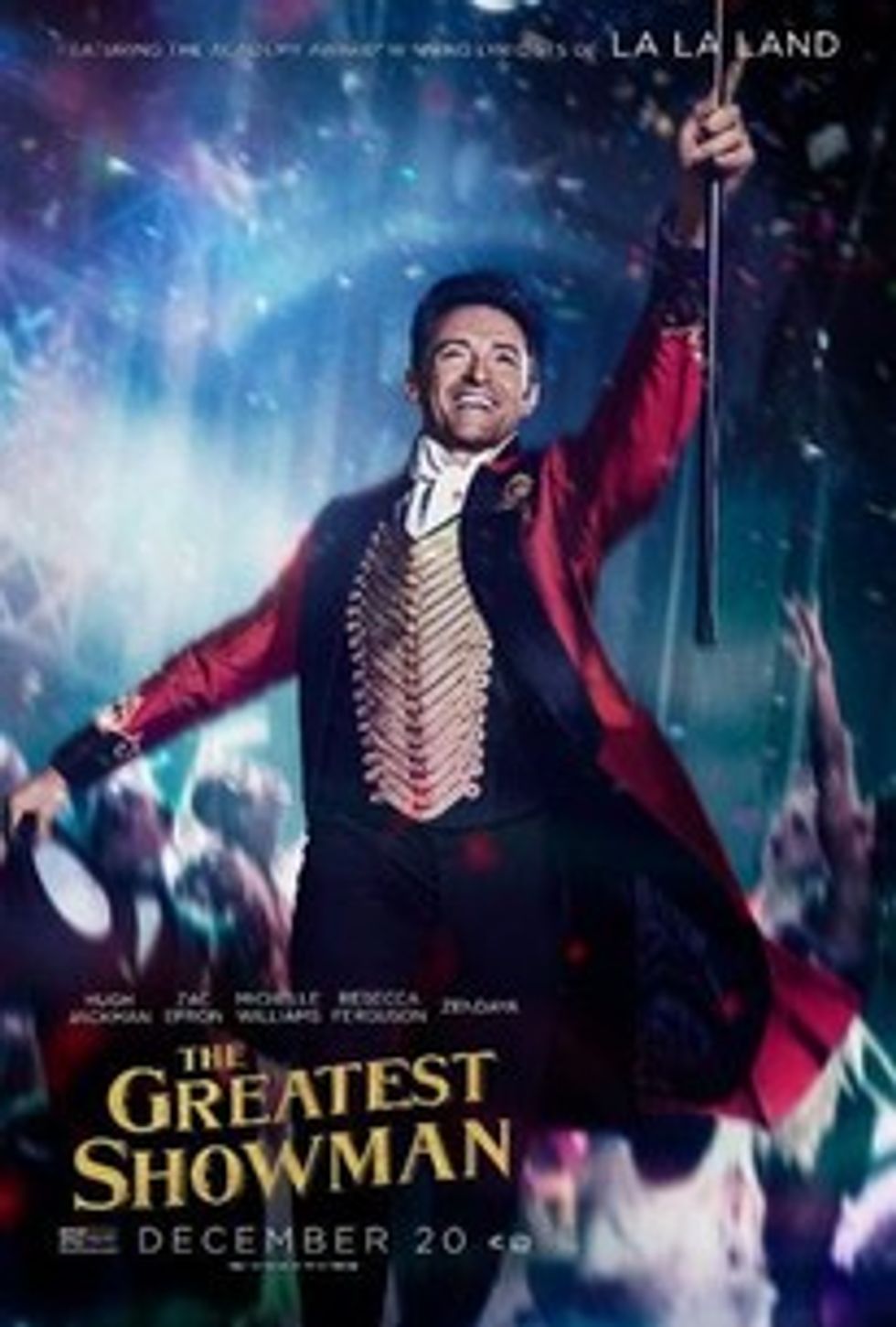
The Greatest Showman
Favorite Quote: “Trust me, they don’t know it yet, but they’re going to love you.”
Michael Gracey’s decorated telling of P.T. Barnum’s backstory encourages us to choose to stop searching for depressing undertones that teach the viewer something about society. Instead, we should bask in the fun tidbits of life, such as Hugh Jackman’s obvious desire to sing and dance in a world that constantly tries to paint him as the badass with wolverine claws.
One word comes to mind when I think about this movie. Pretty. Everything about it was pretty. The use of vibrant colors in the costumes was pretty, the musical outbursts that now consume my Spotify library were pretty, the cinematography* was pretty, Zac Efron was pretty. If you liked La La Land, you’ll like this one. Even if you were one of the many soul-suckers that hated La La Land, you’ll probably still like this one. The magic of this film will absolutely consume you, but only if you aren’t actively searching for a reason to hate it.
*Cinematography is what is seen in a shot; lighting, camera angles, focus, color, how the scene is framed, etc all relate to the quality of the cinematography.
Writers: Jenny Bicks and Bill Condon
Director: Michael Gracey
Running Time: 93 minutes
Main Cast: Hugh Jackman, Michelle Williams, Zac Efron, Zendaya
Rating: PG
Hopefully these reviews have made you slightly more prepared for the 90th Academy Awards. The Oscars will premiere on ABC on March 4th, 2018 at 8:00 p.m. EST.

